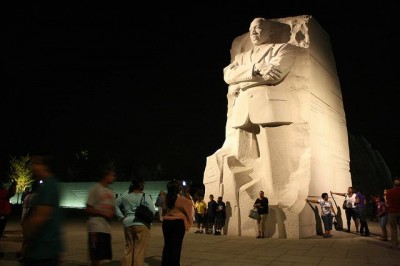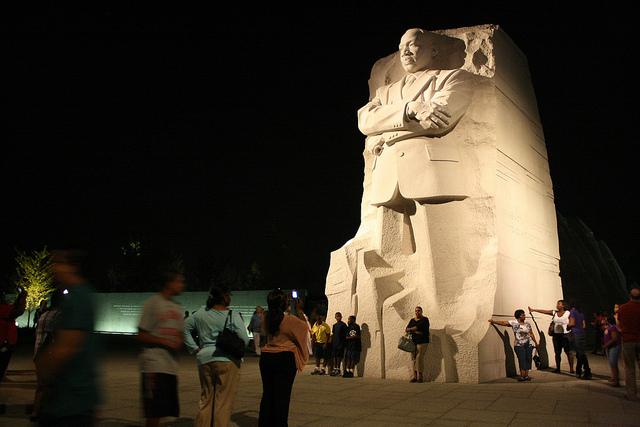At the end of August, I headed over to the opening of the Martin Luther King, Jr. Memorial right before the hurricane. I returned this past weekend for the official dedication, which brought more than 10,000 people to what now is sacred ground.

Obama connected with MLK’s domestic agenda against poverty and disenfranchisement, but ignored MLK’s stance against increased militarim. CC photo by absentmindedprof.
But while Obama was quick to pay lip service to King’s work for civil rights and economic justice and play to the popular sentiments of those “Occupying Everywhere,” Obama didn’t mention King’s equally important efforts to stop the Vietnam War and end U.S. militarism.
This omission probably wasn’t a mistake. Obama sent 100 U.S. troops to Uganda on Friday and over the weekend he encouraged the incursion of Kenyan military troops into Somalia, a continuing target for U.S. aerial drone strikes.
Noting the U.S. interest in securing oil in Uganda, and viewing Somalia as part of the “global war on terrorism,” IPS Africa expert Emira Woods says that Obama, dubbed the “Son of Africa” by many in the region, is betraying many of the core values his fellow Nobel Peace Laureate Martin Luther King, Jr. fought for.
Also, as the weekend set upon us, two women who are longtime peace advocates on the African content joined King and Obama as Nobel Peace Prize winners: Liberian President Ellen Johnson-Sirleaf and Liberian peace activist Leymah Gbowee, along with Yemeni activist Tawakkul Karman.
Appearing on PBS News Hour, Democracy Now and other outlets, Woods was quick to acknowledge the similarities between these awardees and Obama. Gbowee was a tireless community organizer. Johnson-Sirleaf was the first woman in Africa to serve as a democratically elected president. Unfortunately, Johnson-Sirleaf also shares Obama’s agenda of establishing a permanent U.S. military command, AFRICOM, showing that the Peace Prize isn’t always about peace.
It was wonderful to see so many of you at our Letelier-Moffitt Human Rights Awards reception and ceremony last week. That night, the Wisconsin Progressive Movement and Bethlehem, The Migrant’s Shelter (Mexico) showed what can be possible with faith, love, and determination.
Sign up to receive the Institute’s Unconventional Wisdom newsletter every other Thursday.
